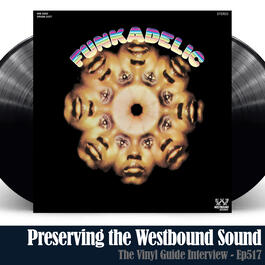
Ep517: Preserving the Westbound Sound
Mastering Engineer Dave Gardner & Audio Archivist Catherine Vericolli discuss the preservation of the Westbound Records audio catalogue, including the masters of legendary recordings by Funkadelic, The Counts, Ohio Players & more. Topics Include: Dave Gardner (mastering engineer) and Catherine Vericoli (archivist) introduce their specialized roles Mastering serves as link between creative process and manufacturing standards Catherine transfers analog tapes to highest possible digital quality preservation Physical restoration work includes extensive mold and splice remediation tasks Much archival work involves "audio archaeology" detective work with clues Working backwards from incomplete information when documentation is missing completely Common assumption that old records were always done "the right way" Reality reveals beloved records often weren't made using proper methods Got rare access to examine entire Westbound Records collection together Westbound Records started late 1960s by distributor Armin Bolodian in Detroit Detroit-based independent label achieved regional success with multiple hit records Funkadelic, Ohio Players, Detroit Emeralds were among their major successful acts Complete catalog reissue approach rather than cherry-picking just popular hits Assets moved between multiple locations over decades, not everything returned Found various generations and copies of tapes for each release Maggot Brain original masters were believed to be permanently missing Discovery of missing masters hidden in completely unmarked white archive boxes Original tape playback speeds rarely match speeds of vinyl releases Spent entire week meticulously fine-tuning correct playback speeds for accuracy Academic ethnomusicologist confirmed musical key was wrong on commercial releases Many recent European reissues contain fundamentally inaccurate speed and sound Double 45 RPM format avoids sonic compromises required for long sides 27-minute album sides on 33 RPM required major audio quality sacrifices All-analog cutting process preserves original sound character without digital conversion Unreleased material exists primarily in unprocessed multitrack tape format only Dennis Coffey played guitar on many more Funkadelic recordings than known Analog tape degradation accelerating rapidly, especially problematic for digital formats Cultural preservation mission drives their passionate collaborative archival restoration work Asset paranoia and trust issues affect access to important historical recordings Primary motivation remains saving irreplaceable music for all future generations High resolution version of this podcast is available at: www.Patreon.com/VinylGuide Apple: https://tinyurl.com/tvg-ios Spotify: https://tinyurl.com/tvg-spot Amazon Music: https://tinyurl.com/tvg-amazon Support the show at Patreon.com/VinylGuide
From "The Vinyl Guide - Artist Interviews for Record Collectors and Music Nerds"


Comments
Add comment Feedback